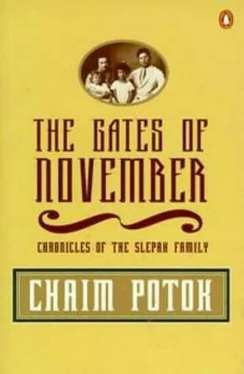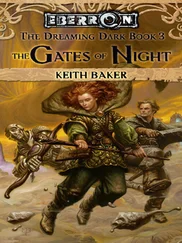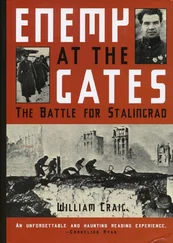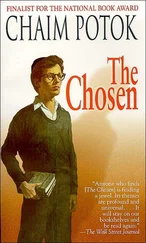I consider the things included. The central mystery of Solomon Slepak’s life: his repeated escapes from the clutches of Stalin. There has been no success in obtaining his KGB files, though many attempts were made before and during the writing of this work.
Recently a letter arrived from the KGB addressed to the grandmother of Olga, Leonid’s wife. The grandmother, a woman in her eighties who resides in Moscow, was terrified by the return address and immediately telephoned Leonid in New York. It turned out he had forgotten to tell her that while in Moscow some weeks before, he had made out an application to see the KGB files on his father and grandfather and given her name as an in-care-of local address.
The letter, dated June 27, 1995, reads:
Your application regarding Slepak, Vladimir Semyonovich, was reviewed.
In accordance with Article No. 5 of the Legal Code of the Russian Federation, “On Search Activity in the Russian Federation,” materials in connection with Slepak, V. S., as an individual whose guilt in committing a crime was not proved in an established manner, were destroyed.
At the same time, we also inform you that, in accordance with the above-mentioned article, the right to demand from the authorities of the Federal Service of Security the data about the nature of the received information in regard to that person is available only to the person himself, whose guilt in committing a crime was not proved according to the procedures established by law.
A. V. Tsarenko
Deputy Chief
It is not much of a consolation for Volodya and Masha to be told now by the KGB that Volodya’s sentence to five years of exile was illegal. Volodya has decided to pursue the matter of his KGB files and will address his request directly to President Boris Yeltsin.
There is no mention in the letter about Leonid’s request to see the KGB files on his grandfather, the Old Bolshevik, Solomon Slepak.
I consider, too, my fascination with Volodya’s story, the way it held me in its grasp for years after its proximate appeal evaporated. Why did interest linger? What was there about it that was so beguiling? Perhaps the writer as amanuensis, as one watching from the sidelines and recording in safety the savage struggles of the activist, and wishing he had that courage, that boldness, to plunge into the foulness of existence, engage its cruelties, chance the scars of flesh and mind, face the possibility of annihilation? The individual who crosses the boundary from bystander to activist and hazards his or her life to change the world-an eternal mystery how that choice is made, that moment of crossing, the wonder of that transfiguration. The writer gazes upon it with awe, is mesmerized by its large daring, its radiance.
I have thought often about the exile of the Slepaks compared with the years in prisons and labor camps meted out to so many others. Torture, we know, leaves permanent psychic scars. Refusal is a condition of torture, crueler perhaps than exile, for there is a terminus to exile, and none to refusal. And surely exile is torture. During their five years in Siberia, Volodya and Masha experienced physical and mental subjugation, torture of an explicit and violating sort, and an initiation into the indifferent cruelty of despotism. But it was not the horror experienced, for example, by Gregory Steshenko in a psychiatric hospital, or by Natan Shcharansky and Alexander Solzhenitsyn in prisons and camps. In this regard, Volodya and Masha appear to have been more fortunate than some. Still, what point can there be in comparing pain and punishment? Do we know what scars they bear, what dreams wake them, what echoes of that cruel corner of Siberia haunt their sleep?
And finally, I write with the sobering impression that there is a cautionary tale in the Slepak chronicles; it waves a flag of danger at us in the sullen atmosphere of the early third century of the American Republic. Are there American variations of Solomon Slepak, those rendered so rigid by ideas that all reason fails them? Prudence, a cautious awareness of nuances, of complexities, of consequences, a perception of the unity of the American experience, and a saving sense of irony and humor-pervasive in the Founding Fathers and lacking in contemporary ideologues. Can we learn something from these chronicles about iron righteousness and rigid doctrine, about the stony heart, the sealed mind, the capricious use of law, and the tragedies that often result when theories are not adjusted to realities? Do the chronicles seem to reveal a glaring and almost obvious truth: the larger the nation, the more tumultuous its demise? Are we approaching the finale now to the bright possibilities once inherent in this land? Is that old America forever gone? Indeed, did it ever exist? Were we seduced as schoolchildren into a vision of a land green and golden from sea to shining sea, a land as illusory for many Americans as the Motherland of Solomon Slepak was for Volodya and Masha? Perhaps the more sensible question is not about what we once were but about what we intend ourselves to be one day. Things are happening to us today that we don’t seem able to explain. Can we enter the uncertain future without the corrosive cynicism, the clutching greed, the divisive self-interests-the beasts that destroyed the world of Solomon Slepak and rendered it uninhabitable to his family?
In December 1989 Volodya flew to Moscow to speak at a meeting of representatives of all the Jewish organizations in the former USSR. He arrived on the day Andrei Sakharov was laid to rest but too late to attend the funeral.
In Moscow’s Cinema Center, rented for the conference, he addressed a crowd of about four hundred participants: young people, refuseniks, rabbis, Americans, Israelis. He told them how good it felt to be free, wished the refuseniks good luck, related some anecdotes about his life in Israel, and announced that in his opinion, the Jewish Agency, the body responsible for the settlement of immigrants in Israel, was not doing a proper job. Distrustful as ever of bureaucrats, ministers, and governments, Volodya rarely wasted an opportunity to make his views on that subject known. The head of the Jewish Agency, Simcha Dinitz, was present. There was a row.
The following day Volodya visited Andrei Sakharov’s widow, Elena Bonner, and afterward went with members of the Israeli delegation to Sakharov’s grave in the Vostriakovskoe Cemetery. They placed flowers on the grave and stood in silence in the gathering darkness.
One day that week Volodya traveled alone to his old apartment on Gorky Street, bearing a bouquet of flowers. A cold winter day, the streets of Moscow dirty with snow. He went past the bookstore and beneath the archway and through the courtyard and the entrance door and into the small foyer and climbed the half-flight of stairs to the narrow elevator. Then the rickety ride up. Apartment 77. The brown wooden door.
They were still there, the family with whom he and Masha had exchanged apartments back in March 1986: a married couple in their thirties, with a little girl; the woman’s, maternal grandmother, and her paternal grandmother’s sister-that is, her father’s aunt. Only the paternal grandmother’s sister was Jewish. The other two women, the maternal grandmother and the young wife, were Russian; the young husband, half Russian, one-quarter Uzbek, one-quarter Ukrainian.
They were delighted to see Volodya. The man opened a bottle of cognac. They asked about life in Israel. Were Volodya and Masha happy there? And how were the boys? Volodya remained for two hours, talking.
Afterward he walked down one flight to the apartment of his old friends, a man and woman in their sixties. The man, Leonid, was an architect and the son of the Russian composer Reinhold Moritzovich Glière. His wife, Tamara, was an editor in a major children’s publishing house; her father, once a member of the Moscow City Council. Their daughter had been in Sanya’s class all through high school.
Читать дальше












